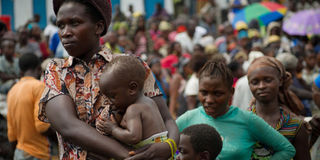DR Congo urged to prosecute soldiers over rape in the east

A displaced Congolese woman and her young child stand in a crowd of people waiting for humanitarian aid in a camp for the internally displaced in Mugunga, 8km west of Goma in the east of the Democratic Republic of the Congo on November 24, 2012 following fighting between the government army and M23 rebels. The United Nations Sunday urged the Kinshasa government to prosecute soldiers for dozens of sexual assaults against women in the east of the Democratic Republic of Congo last year. PHOTO/FILE.
What you need to know:
- Its joint investigation with the UN human rights agency recorded 135 cases of sexual violence committed by the regular army in and around the city of Minova in November 2012, MONUSCO chief Martin Kobler noted.
KINSHASA, Sunday
The United Nations Sunday urged the Kinshasa government to prosecute soldiers for dozens of sexual assaults against women in the east of the Democratic Republic of Congo last year.
"Congolese officials should fulfill their obligations... towards the victims of such atrocious acts and their families to whom justice must be rendered," the head of the UN mission in the country, MONUSCO, said in a statement.
Its joint investigation with the UN human rights agency recorded 135 cases of sexual violence committed by the regular army in and around the city of Minova in November 2012, MONUSCO chief Martin Kobler noted.
According to Human Rights Watch, soldiers went on a 10-day raping and looting rampage in the area while they were fleeing an offensive by rebels of the March 23 Movement (M23) on the main city of Goma, further north.
"Almost a year after these incidents, none of the presumed perpetrators of these human rights violations has been brought to justice... in spite of the Congolese authorities’ commitment to prosecute the perpetrators," the MONUSCO statement said.
The DR Congo government signed an accord with the United Nations in April to step up the fight against sexual abuse by armed groups and soldiers, which remains rampant mainly in the volatile east of the country.
The feeble DR Congo army has been much criticised for its brutality against civilians and corruption. UN officials said it "melted away" during the M23 advance on Goma, which the rebels took over on November 20 and held for nearly two weeks.
MONUSCO also recalled in the statement that the investigation identified 59 cases of sexual violence committed by M23 fighters in the Goma area during the same period.
The DR Congo army is heavily reliant on UN equipment and military support in its efforts to control the armed groups that hold sway in the resource-rich region.
Meanwhile, rebels in the Democratic Republic of Congo (DRC) said yesterday they are heading toward “major breakthroughs” with the Kinshasa government in peace talks in Uganda.
Under Uganda’s mediation, "major breakthroughs are about to be obtained in Kampala since the heavy involvement of the international community in the dialogue" between the two sides, the M23 movement said in a statement.
Mr Lambert Mende, a minister and Congolese government spokesman, was more circumspect, telling AFP that "breakthroughs will be measured against the final agreement," if one were signed.
"There has been some reconciliation," Mende said in Kinshasa, but stressed that although the M23 could “sign today”, that would “not be the end of the problem."
In contrast, the rebels referred to the "remarkable presence" of US special envoy to the Great Lakes Russ Feingold and the UN special envoy Mary Robinson as well as Martin Kobler, the head of the UN mission to the DRC, and representatives of the European Union and African Union.
During talks on Friday, "the M23 made major concessions on its political demands in order to make possible the signing of the peace agreement in Kampala in the coming hours," the group said.
"By this act, our movement wishes to demonstrate its determination to contribute to the rapid establishment of a lasting peace in the Democratic Republic of Congo," it said.
The M23 controls an area of around 700 square kilometres in the east of the DRC, bordering Rwanda and Uganda.
The group was founded by former Tutsi rebels who were incorporated into the Congolese army under a 2009 peace deal.
Complaining the deal was never fully implemented, they mutinied in April 2012, turning their guns on their former comrades and launching the latest rebellion to ravage DR Congo’s mineral-rich and conflict-prone east.
The United Nations regularly accuses Rwanda and Uganda of supporting the M23, something both countries deny.
Mende affirmed that Rwanda had a key role in the outcome of rebels’ future in the country, and said "the principal player could always restart this crisis. It is Rwanda’s attitude that is the deciding factor."
The negotiations in Kampala had reportedly stumbled over the question of an amnesty for the rebels and their reintegration in the army.
Backed by the international community, the government in Kinshasa has said there will be no impunity for the main rebel leaders.
(AFP)





